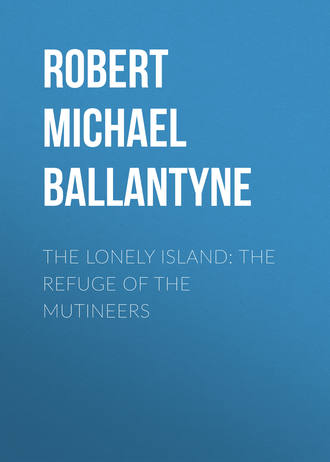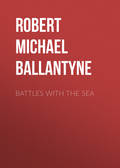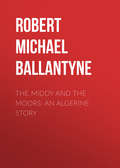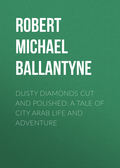
Robert Michael Ballantyne
The Lonely Island: The Refuge of the Mutineers
Chapter Nine
Sally’s Chief Joys—Dark Clouds Overspread the Pitcairn Sky, and Darker Deeds are done
Just before John Adams left the settlement for the purpose of calling Christian, whose retreat at the mountain-top was by that time well-known to every one, little Sally had gone, as was her wont, to enjoy herself in her favourite playground. This was a spot close to the house of Edward Young, where the débris of material saved from the Bounty had been deposited. It formed a bristling pile of masts, spars, planks, cross-trees, oars, anchors, nails, copper-bolts, sails, and cordage.
No material compound could have been more dangerous to childhood, and nothing conceivable more attractive to Sally. The way in which that pretty little nude infant disported herself on that pile was absolutely tremendous. She sprang over things as if she had been made expressly to fly. She tumbled off things as if she had been created to fall. She insinuated herself among anchor-flukes and chains as if she had been born an eel. She rolled out from among the folds of sails as if she were a live dumpling. She seemed to dance upon upturned nails, and to spike herself on bristling bolts; but she never hurt herself,—at least if she did she never cried, except in exuberant glee.
Now, it was while thus engaged one day that Sally became suddenly conscious of a new sound. Young as she was, she was fully alive to the influence of a new sensation. She paused in an attitude of eager attention. The strange sound came from Christian’s hut. Sally waddled thither and looked in. The first thing that met her gaze was her own mother with a live creature in her hands, which she was carefully wrapping up in a piece of cloth. It was a pitifully thin whitey-brown creature, with a puckered face, resembling that of a monkey; but Sally had never seen a monkey, and probably did not think of the comparison. Presently the creature opened its mouth, shut its eyes, and uttered a painfully weak squall.
Cause and effect are not infrequently involved in mystery. We cannot tell why Sally, who never cried, either when hurt or scolded, should, on beholding this sight, set up a tremendous howl; but she did, and she kept up the howl with such vigour that John Adams was attracted to the spot in some alarm.
Stopping only long enough to look at the infant and see that the mother was all right, Adams ran off at full speed to the mountain-top, as we have seen, to be the first to announce the joyful news to the father.
Thus came into the world the first “descendant” of the mutineers of the Bounty.
It was with unwonted animation that the men sat down to supper that evening, each having congratulated Christian and inquired at the hut for the baby and mother, as he came in from work.
“What will you call him?” inquired Young, after pledging the new arrival in a cup of cocoa-nut milk.
“What day is it?” asked Christian.
“Thursday,” answered Martin.
“Then I’ll call him Thursday,” said Christian; “it will commemorate the day.”
“You’d better add ‘October,’ and commemorate the month,” said Adams.
“So I will,” said Christian.
“An’ stick on ‘Seventeen-ninety’ to commemorate the year,” suggested Mills.
“No, there are limits to everything,” returned Christian; “three names are enough. Come, fill up your cups, lads, and drink to Thursday October Christian!”
With enthusiasm and a shout of laughter, the toast was pledged in cocoa-nut milk, and once again Christian’s hand was shaken by his comrades all round.
The advent of TOC, as Adams called him, (or Toc, as he afterwards came to be styled), was, as it were, the breaking of the ice. It was followed ere long by quite a crop of babies. In a few months more a Matthew Quintal was added to the roll. Then a Daniel McCoy furnished another voice in the chorus, and Sally ceased to disquiet herself because of that which had ceased to be a novelty. This all occurred in 1791. After that there was a pause for a brief period; then, in 1792, Elizabeth Mills burst upon the astonished gaze of her father, and was followed immediately by another Christian, whom Fletcher, discarding his eccentric taste for days and months, named Charles.
By this time Sally had developed such a degree of matronly solicitude, that she was absolutely intrusted at times with the care of the other children. In a special manner she devoted herself to little Charlie Christian, who was a particularly sedate infant. Indeed, solemnity was stamped upon that child’s visage from his birth. This seemed to harmonise intensely with Sally’s sense of fun. She was wont to take Charlie away from his mother, and set him up on a log, or the rusty shank of the Bounty’s “best bower,” prop him up with sticks or bushes—any rubbish that came to hand—and sit down in front of him to gaze. Charlie, after the first few months of precarious infancy, became extremely fat. He used to open his solemn eyes as wide as was possible in the circumstances, and return the gaze with interest. Unable to restrain herself, Sally would then open her pretty mouth, shut her gorgeous eyes, and give vent to the richest peals of laughter.
“Oh, you’s so good, Charlie!”
She had learned by that time to speak broken English in an infantine fashion, and her assertion was absolutely true, for Charlie Christian was preternaturally good.
The same cannot be said of all the members of this little community. Ere long, a period approached when the harmony which had hitherto prevailed was about to be broken. Increasing life had marked their course hitherto. Death now stepped in to claim his share.
The wife of John Williams went out one day to gather gulls’ eggs among the cliffs. The women were all in the habit of doing this at times, and they had become expert climbers, as were also the men, both white and brown.
When day began to close, they wondered why Mrs Williams was so late of returning. Soon her husband became uneasy; then, taking alarm, he went off to search for her, accompanied by all the men. The unfortunate woman was found dead at the base of the cliffs. She had missed her footing and fallen while searching for eggs.
This accident had at first a deeply solemnising effect on the whole community. Accustomed though these men were to the sight of death in some of its worst forms in war, they were awed by this sudden and unexpected assault of the great enemy. The poor mangled body lying so quietly among the rocks at the foot of the awful precipice, the sight of the husband’s grief, the sad and silent procession with the ghastly burden in the deepening gloom of evening, the wailing of the women, and the awestruck gaze of such of the children as were old enough to know that something terrible had occurred, though unable to understand it,—all conspired to deepen the impression, even on those among the men who were least easily impressed; and it was with softened feelings of pity that Quintal and McCoy, volunteering their services on the occasion, dug the first grave at Pitcairn.
Time, however, soon wore away these feelings. Williams not only got over his bereavement easily, but soon began to wish for another wife. It was, of course, impossible to obtain one righteously in the circumstances; he therefore resolved to take the wife of Talaloo the Otaheitan.
It must not be supposed that all Williams’, comrades supported him in this wicked design. Christian, Young, and Adams remonstrated with him strongly; but he was obstinate, and threatened to take the boat and leave the island if they interfered with him. As he was an expert blacksmith, his comrades could not afford to lose him, and ceased remonstrating. Eventually he carried out his intention.
This was, as might have been expected, the beginning of trouble. The coloured men made common cause of it, and from that time forward began to plot the destruction of their white masters. What made matters worse was that Talaloo’s wife was not averse to the change, and from that time became a bitter enemy of her Otaheitan husband. It was owing to this wicked woman’s preference for Williams that the plot was afterwards revealed.
One evening, while sitting in Christian’s house, Talaloo’s wife began to sing a sort of extempore song, the chorus to which was:—
“Why does black man sharpen axe?
To kill white man.”
Hearing this, Christian, who was close at hand, entered the hut and demanded an explanation. On being informed of the plot of the Otaheitan men to murder all the whites, a dark frown overspread his face. Hastily seizing his musket, he loaded it, but it was observed that he put no bullet in.
The Otaheitans were assembled at the time in a neighbouring house. Christian went straight to the house, charged the men with their guilty intentions, pointed his gun at them, and pulled the trigger. The piece missed fire. Before he could re-cock, Talaloo leaped through the doorway, followed by his friend Timoa, and took shelter in the woods.
The other four men begged for mercy, said that the two who had just left were the instigators as well as ringleaders in the plot, and promised to hunt them down and murder them if their own lives should be spared. As Christian had probably no fixed intention to kill any of the men, and his sudden anger soon abated, he accepted their excuses and left them. It was impossible, however, for the mutineers to feel confidence in the natives after that. The two men who had fled for refuge to the bush did not return to the settlement, but remained in hiding.
One day Talaloo’s wife went, with some of the other women, to the southern side of the island to fish from the rocks. They were soon busily at work. The lines used had been made by themselves from the fibrous husk of the cocoa-nut. The hooks had been brought on shore from the Bounty. Chattering and laughing with the free-and-easy gaiety of savages, they plied their work—it seemed more like play—with varying success.
Suddenly the wife of Talaloo heard a faint hiss behind her. Turning her head, she saw her former husband in the bushes. He beckoned to her, and disappeared. None of the other women appeared to have heard or observed the man. Presently, Talaloo’s wife rose, and going into the woods, joined her husband. She found him in company with Timoa.
“Is Talaloo become a dog that he should be driven to live in the bush?” demanded the man, with a stern air.
“The white men are strong,” answered his wife, with a subdued look; “the women can do nothing.”
“You can stay with me here in the bush if you will,” said Talaloo. “The white men are strong, but we are stronger. We will kill the white men.”
He turned with an air of offended dignity, and strode away. His wife meekly followed, and Timoa went with them.
Now, there was one woman among the fishers whose eyes were sharp and her hearing was keen.
This was Susannah, the wife of the midshipman Edward Young. She had followed Talaloo’s wife, saw what occurred, and carried back a report to the settlement. A council of war was at once held.
“If we leave these men at liberty,” said Williams, “we shall never again be able to go to rest in security.”
“Something must be done,” said Christian, with the air of a man whose mind wanders far away from the subject in hand.
“Kill them,” suggested McCoy.
“Yes,” said Quintal; “I vote that we get up a grand hunt, run them to earth, and shoot them like dogs, as they are.”
“Not so easy as you think to hunt down such men among these wild and wooded hills,” said Young. “Besides, it is only Talaloo who has threatened us; Timoa is guiltless, I think.”
“I’ll tell you what we’ll do, lads; we’ll poison ’em,” said Williams. “I’ve heard of such a thing bein’ done at Otaheite by one of the women. She knows how to get the poison from some sort of plant, I believe, and I’m pretty sure that Menalee will help us.”
The plan thus suggested was finally adopted. One of the women made three puddings, two of which were good, the third was poisoned. Menalee at once agreed to go to the fugitives, say he had stolen the puddings, and would be willing to share them. The two good puddings were to be given to Talaloo’s wife and Timoa, the poisoned one to Talaloo himself. For further security Menalee was to carry a pistol with him, and use it if necessary.
The assassin was not long in tracking out his countrymen.
“You bring us food?” said Talaloo.
“Yes, I have stolen it. Will you have some?”
They all accepted the puddings, and Timoa and the woman began to eat; but Talaloo was quick witted. He observed something unusual in Menalee’s manner, suspected poison, and would not eat his pudding. Laying it aside, he ate that of his wife along with her.
Menalee pretended not to notice this. After the others had done eating, he proposed that they should all go a little farther up into the bushes, where, he said, he had left his own wife among some breadfruit trees.
Talaloo agreeing to this, they rose and walked away. The footpath being narrow, they were obliged to go in single file. Menalee walked behind Talaloo. After having gone a few paces, the former drew his pistol, pointed it at the back of his countryman’s head, and pulled the trigger, but it missed fire. Talaloo hearing the click, turned round, saw the pistol, and immediately fled; but his enemy was swift of foot, soon overtook him, and the two grappled. A severe struggle ensued, Timoa and the woman standing by and looking on, but rendering help to neither party.
The two combatants were pretty well matched. The pistol had fallen at the first onset, and for a few minutes it seemed doubtful which should prove the victor, as they swayed to and fro, straining their dark and sinewy forms in deadly conflict. At last the strength of Talaloo seemed to give way, but still he retained a vice-like grasp of his antagonist’s right wrist.
“Won’t you help me?” gasped Talaloo, turning an appealing glance on his wife.
“No,” cried Menalee, “but she will help me to kill Talaloo.”
The hardened woman picked up the pistol, and going towards her husband struck him on the head. Menalee quickly finished with his knife what the murderess had begun.
For a few minutes the three stood looking at the murdered man in silence, when they returned to the settlement and told what they had done. But the assassin’s work was not yet over. Another of the natives, named Ohoo, had fled to the woods, threatening vengeance against the white men. It was deemed necessary that he too should be killed, and Menalee was again found to be a willing instrument. Timoa, who had exhibited such callous indifference at the murder of Talaloo, was his fitting companion. They soon found Ohoo, and succeeded in killing him.
Strange to say, the mutineers, after these foul deeds, dwelt for a long time in comparative peace and harmony. It seemed as if their worst feelings had found full vent and been expended in the double murder. No doubt this state of hollow peace was partly owing to the fact that the native men, now being reduced to four in number, felt themselves to be unable to cope with their masters, and quietly submitted to the inevitable.
But by degrees the evil spirits in some of the party began to reassert their power. McCoy and Quintal in particular became very savage and cruel. They never hesitated to flog or knock down a native on the slightest pretext, insomuch that these unhappy men were again driven to plot the destruction of their masters. Adams, Christian, and Young were free from the stain of wanton cruelty. Young in particular was kind to the natives, and a favourite both with men and women.
Chapter Ten
Dangers, Joys, Trials, and Multiplication
“I’m going to the cliffs to-day, Williams,” said Young one morning. “Will you come?”
Williams was busy at the forge under the pleasant shade of the great banyan-tree. Resting his hammer on the anvil, he looked up.
“No,” he answered. “I can’t go till I’ve finished this spade. It’s the last bit of iron we have left that’ll serve for such a purpose.”
“That’s no reason why you should not let it lie till the afternoon or to-morrow.”
“True, but I’ve got another reason for pushing through with it. Isaac Martin says the want of a spade keeps him idle, and you know it’s a pity to encourage idleness in a lazy fellow.”
“You are right. What is Martin about just now?”
“Working at the big water-tank. It suits him, a heavy quiet sort of job with the pick, requiring no energy or thought,—only a sleepy sort o’ perseverance, of which long-legged Isaac has plenty.”
“Come, now,” returned Young, with a laugh. “I see you are getting jealous of Martin’s superior intellect. But where are Quintal and McCoy?”
“Diggin’ in their gardens, I suppose. Leastwise, I heerd Mr Christian say to Mainmast he’d seen ’em go off in that direction. Mr Christian himself has gone to his old outlook aloft on the mountains. If he don’t see a sail at last it won’t be for want o’ keepin’ a bright look-out.”
The armourer smiled grimly as he thrust the edge of the half-formed spade into the fire, and began to blow his bellows.
“You’ve got them to work again,” said Young, referring to the bellows which had belonged to the Bounty.
“Ay, patched ’em up after a fashion, though there’s a good deal o’ windage somewheres. If them rats git hold of ’em again, the blacksmith’s occupation’ll be gone. Here comes Bill Brown; p’r’aps he won’t object to go bird-nestin’ with ’ee.”
The armourer drew the glowing metal from the fire as he spoke, and sent the bright sparks flying up into the leaves of the banyan-tree while the botanist approached.
“I’ll go, with all my heart,” said Brown, on being invited by Young to accompany him. “We’d better take Nehow with us. He is the best cliff-man among the natives.”
“That’s just what I thought of doing,” said Young, “and—ah! here comes some one else who will be glad to go.”
The midshipman’s tone and manner changed suddenly as he held out both hands by way of invitation to Sally, who came skipping forward, and ran gleefully towards him.
Sally was no longer the nude cherub which had landed on the island. She had not only attained to maturer years, but was precocious both in body and mind,—had, as we have shown, become matronly in her ideas and actions, and was clothed in a short petticoat of native cloth, and a little scarf of the same, her pretty little head being decorated with a wreath of flowers culled and constructed by herself.
“No, I can’t go,” answered Sally to Young’s invitation, with a solemn shake of her head.
“Why not?”
“’Cause I’s got to look arter babby.”
Up to this period Sally had shown a decided preference for the ungrammatical language of the seamen, though she associated freely with Young and Christian. Perhaps her particular fondness for John Adams may have had something to do with this.
“Which baby, Sall? You know your family is a pretty large one.”
“Yes, there’s a stunnin’ lot of ’em—a’most too many for me; but I said the babby.”
“Oh, I suppose you mean Charlie Christian?”
“In coorse I means Challie,” replied the child, with a smile that displayed a dazzling set of teeth, the sparkle of which was only equalled by that of her eyes.
“Well, but you can bring Charlie along with you,” said Young, “and I’ll engage to carry him and you too if you get tired. There, run away; find him, and fetch him quick.”
Little Sall went off like the wind, and soon returned with the redoubtable Charles in her arms. It was all she could do to stagger under the load; but Charlie Christian had not yet attained to facility in walking. He was still in the nude stage of childhood, and his faithful nurse, being afraid lest he should get badly scratched if dragged at a rapid pace through the bushes, had carried him.
Submitting, according to custom, in solemn and resigned surprise, Charlie was soon seated on the shoulders of our midshipman, who led the way to the cliffs. William Brown followed, leading Sally by the hand, for she refused to be carried, and Nehow brought up the rear.
The cliffs to which their steps were directed were not more than an hour’s walk from the settlement at Bounty Bay, though, for Sally’s sake, the time occupied in going was about half-an-hour longer. It was a wild spot which had been selected. The towering walls of rock were rugged with ledges, spurs, and indentations, where sea-birds in myriads gave life to the scene, and awakened millions of echoes to their plaintive cries. There was a pleasant appearance of sociability about the birds which was powerfully attractive. Even Nehow, accustomed as he was to such scenes, appeared to be impressed. The middy and the botanist were excited. As for Sally, she was in ecstasies, and the baby seemed lost in the profoundest fit of wonder he had experienced since the day of his birth.
“Oh, Challie,” exclaimed his nurse in a burst of laughter, “what a face you’s got! Jis’ like de fig’r’ead o’ the Bounty.” (Sall quoted here!) “Ain’t they bootiful birds?”
She effectually prevented reply, even if such had been intended, by suddenly seizing her little charge round the neck and kissing his right eye passionately. Master Charlie cared nothing for that. He gazed past her at the gulls with the unobliterated eye. When she kissed him on the left cheek, he gazed past her at the gulls with the other eye. When she let him go, he continued to gaze at the gulls with both eyes. He had often seen the same gulls at a distance, from the lower level of Bounty Bay, but he had never before stood on their own giddy cliffs, and watched them from their own favourite bird’s-eye-view point; for there were thousands of them sloping, diving, and wheeling in the airy abyss, pictured against the dark blue sea below, as well as thousands more circling upwards, floating and gyrating in the bright blue sky above. It seemed as if giant snowflakes were trembling in the air in all directions. Some of the gulls came so near to those who watched them that their black inquiring eyes became distinctly visible; others swept towards them with rustling wings, as if intending to strike, and then glanced sharply off, or upwards, with wild cries.
“Wouldn’t it be fun to have wings?” asked Brown of Sally, as she stood there open-mouthed and eyed.
“Oh, wouldn’t it?”
“If I had wings,” said Young, with a touch of sadness in his tone, “I’d steer a straight course through the air for Old England.”
“I didn’t know you had such a strong desire to be hanged,” said Brown.
“They’d never hang me,” returned Young. “I’m innocent of the crime of mutiny, and Captain Bligh knows it.”
“Bligh would be but a broken reed to lean on,” rejoined Brown, with a shrug of contempt. “If he liked you, he’d favour you; if he didn’t, he’d go dead against you. I wouldn’t trust myself in his hands whether innocent or guilty. Depend upon it, Mr Young, Fletcher Christian would have been an honour to the service if he had not been driven all but mad by Bligh. I don’t justify Mr Christian’s act—it cannot be defended,—but I have great sympathy with him. The only man who deserves to be hanged for the mutiny of the Bounty, in my opinion, is Mr Bligh himself; but men seldom get their due in this world, either one way or another.”
“That’s a powerfully radical sentiment,” said Young, laughing; “it’s to be hoped that men will at all events get their due in the next world, and it is well for you that Pitcairn is a free republic. But come, we must go to work if we would have a kettle of fresh eggs. I see a ledge which seems accessible, and where there must be plenty of eggs, to judge from the row the gulls are making round it. I’ll try. See, now, that you don’t get yourself into a fix that you can’t get out of. You know that the heads of you landsmen are not so steady as those of seamen.”
“I know that the heads of landsmen are not stuffed with such conceit as the heads of you sailors,” retorted Brown, as he went off to gather eggs.
“Now, Sally, do you stop here and take care of Charlie,” said Young, leading the little girl to a soft grassy mound, as far back from the edge of the cliff as possible. “Mind that you don’t leave this spot till I return. I know I can trust you, and as for Charlie—”
“Oh, he never moves a’most, ’xcept w’en I lifts ’im. He’s so good!” interrupted Sally.
“Well, just keep a sharp eye on him, and we’ll soon be back with lots of eggs.”
While Edward Young was thus cautioning the child, William Brown was busy making his way down the cliffs to some promising ledges below, and Nehow, the Otaheitan, clambered up the almost perpendicular face of the part that rose above them. (See frontispiece.)
It was interesting to watch the movements of the three men. Each was, in his own way, venturesome, fearless, and more or less practised in cliff climbing. The midshipman ascended the perpendicular face with something of a nautical swagger, but inasmuch as the ledges, crevices, and projections were neither so well adapted to the hands nor so sure as ratlines and ropes, there was a wholesome degree of caution mingled with his confidence. When the wished-for ledge was gained, he gave relief to his feelings in a hearty British cheer that reverberated from cliff to cliff, causing the startled sea-gulls to drive the very echoes mad with their clangour.
The botanist, on the other hand, proceeded with the extreme care of a man who knew that a false step or uncertain grip might send him into the seething mass of foam and rocks below. But he did not hesitate or betray want of courage in attempting any difficulty which he had made up his mind to face.
The proceedings of Nehow, however, seemed little short of miraculous. He appeared to run up perpendicular places like a cat; to leap where the others crept, to scramble where his companions did not dare to venture, and, loosely speaking, to hang on occasionally to nothing by the point of his nose, his eyelids, or his finger-nails! We say that he appeared to do all this, but the gulls who watched and followed him in noisy indignation could have told you, if they had chosen, that his eye was quick, that his feet and hands were sure, and that he never trusted foot or hand for one moment on a doubtful projection or crevice.
For some time all went well. The three men soon returned, each with a few eggs which they laid on the grass in three little heaps, to be watched and guarded by Sally, and to be stared at in grave surprise by Charlie. They carried their eggs in three round baskets without lids, and with handles which folded over on one side, so that the baskets could be fitted into each other when not in use, or slung round the necks of the egg-collectors while they were climbing.
The last to return to the children was William Brown. He brought his basket nearly half full of fine eggs, and set it down beside the two heaps already brought in.
“Ain’t they lovely, Sall?” asked Brown, wiping the perspiration from his brow with the sleeve of his coat. That same coat, by the way, was very disreputable—threadbare and worn,—being four years old on the lowest calculation, and having seen much rough service, for Brown had an objection to the tapa cloth, and said he would stick to the old coat as long as it would stick to him. The truth is he felt it, with his worn canvas trousers and Guernsey shirt, to be in some sense a last link to “home,” and he was loath to part with them.
“Lovely!” exclaimed Sally, “they’s jus’ bootiful.” Nothing could exceed “bootiful” in Sally’s mind—she had paid the eggs the highest possible compliment.
Charlie did them, at the same moment, the greatest possible damage, by sitting down in the basket, unintentionally, with an awful crash.
From the gaze of horror that he cast upwards, it was evident that he was impressed with a strong belief that he had done something wrong, though the result did not seem to him unpleasant. The gaze of horror quickly changed into one of alarm when he observed the shocked countenance of Sally, and he burst into uncontrollable tears.
“Poor thing,” said Brown, lifting him out of the mess and setting him on his legs. “Never mind, old man, I’ll fetch you a better basketful soon. You clean him up, Sall, and I’ll be back in a jiffy.”
So saying, Brown took up his basket, emptied out the mess, wiped it with a bunch of grass, and descended the short slope to the cliff edge, laughing as he went.
Poor Sally’s shocked expression had not yet passed off when Charlie came to a sudden stop, shut his mouth tightly and opened his eyes, as though to say, “Well, how do you take it now?”
“Oh, Challie, but you is bad to-day.”
This was enough. The shades of darkest night settled down on Charlie’s miserable soul. Re-shutting his eyes and reopening his mouth, he poured forth the woe of his inconsolable heart in prolonged and passionate howling.
“No, no; O don’t!” cried the repentant Sally, her arms round his neck and fondling him. “I didn’t mean it. I’m so sorry. It’s me that’s bad—badder than you ever was.”
But Charlie refused to be comforted. He flung himself on the grass in agony of spirit, to the alarm and grief of his poor nurse.
“Me’s dood?” he cried, pausing suddenly, with a blaze of inquiry in his wet visage.
“Yes, yes, good as gold—gooder, far gooder!”
Sally did not possess an enlightened conscience at that time. She would have said anything to quiet him, but he would not be quieted.
“Me’s dood—O dood! ah-o-ee-aw-ee!”
The noise was bad enough, but the way he flung himself about was worse. There was no occasion for Sally to clean him up. Rolling thus on the green turf made him as pure, if not bright, as a new pin; but it had another effect, which gave Sally a fright such as she had never up to that time conceived of, and never afterwards forgot.
In his rollings Charlie came to the edge of the knoll where a thick but soft bush concealed a ledge, or drop, of about two feet. Through this bush he passed in a moment. Sally leaped up and sprang to the spot, just in time to see her charge rolling helplessly down the slope to what appeared to be certain death.
There was but a short slope between the bush and the cliff. Rotund little Charlie “fetched way” as he advanced, despite one or two feeble clutches at the rocks.







